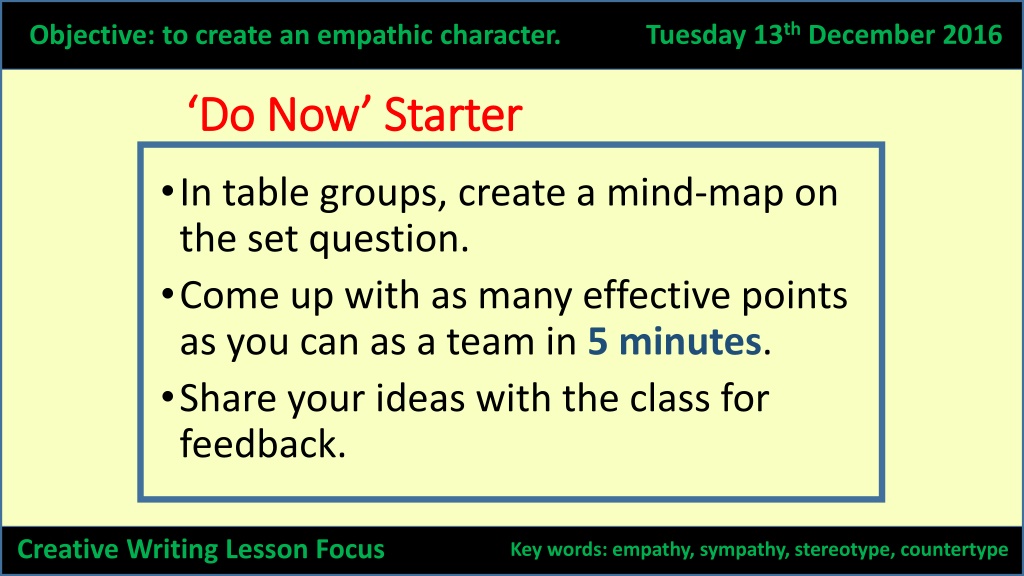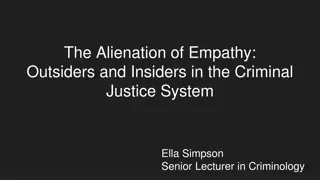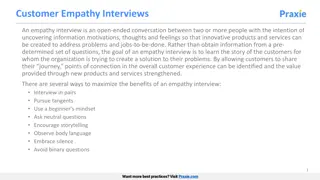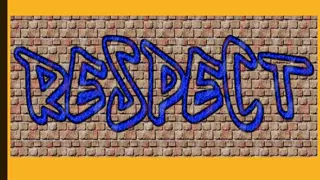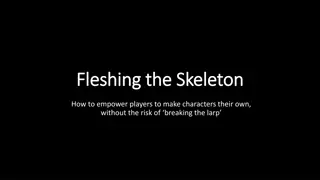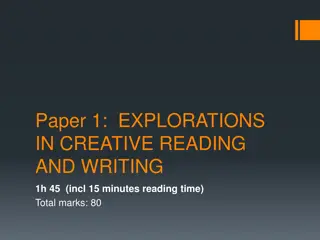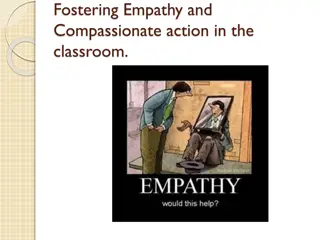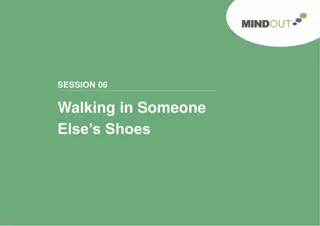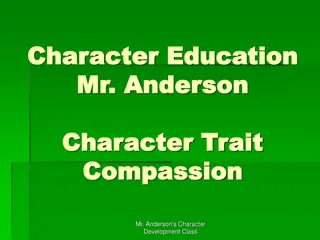Exploring Empathy Through Character Creation in Creative Writing
Delve into the realm of empathy through the art of crafting characters in creative writing. Uncover the nuances of empathy, sympathy, stereotypes, and counter types as you develop engaging and relatable characters. Understand the impact of empathy on storytelling and character perception, as well as the significance of walking in someone else's shoes. Discover the key ingredients of a captivating story and the essential traits that make characters fascinating. Explore the purpose of storytelling and what makes some narratives universally appealing.
Download Presentation

Please find below an Image/Link to download the presentation.
The content on the website is provided AS IS for your information and personal use only. It may not be sold, licensed, or shared on other websites without obtaining consent from the author. Download presentation by click this link. If you encounter any issues during the download, it is possible that the publisher has removed the file from their server.
E N D
Presentation Transcript
Tuesday 13th December 2016 Objective: to create an empathic character. Do Now Starter Do Now Starter In table groups, create a mind-map on the set question. Come up with as many effective points as you can as a team in 5 minutes. Share your ideas with the class for feedback. Creative Writing Lesson Focus Key words: empathy, sympathy, stereotype, countertype
What are the What are the ingredients of a ingredients of a good story? good story? SUGAR PAPER GROUP TASK SUGAR PAPER GROUP TASK
What are the key traits of What are the key traits of a fascinating character? a fascinating character? SUGAR PAPER GROUP TASK SUGAR PAPER GROUP TASK
What is the purpose What is the purpose of storytelling? of storytelling? SUGAR PAPER GROUP TASK SUGAR PAPER GROUP TASK
What makes some stories What makes some stories more popular and universal more popular and universal to readers than others? to readers than others? SUGAR PAPER GROUP TASK SUGAR PAPER GROUP TASK
How does empathy affect How does empathy affect your impression of key your impression of key characters in a narrative? characters in a narrative? SUGAR PAPER GROUP TASK SUGAR PAPER GROUP TASK
Have you ever heard Have you ever heard of the expression: of the expression: to walk a mile in someone else's shoes ?
To walk a mile in someone elses shoes To walk a mile in someone else s shoes What does it mean? What language device has been used in this expression? How does the term empathy relate to this expression?
What is empathy? What is empathy?
What is empathy? What is empathy? To deeply understand and identify with someone else.
What is the difference between What is the difference between empathy and sympathy? empathy and sympathy?
What is the difference between What is the difference between empathy and sympathy? empathy and sympathy? Sympathy may mean that you care for someone, but possibly out of pity rather than sensing a connection with that person. Sympathy can be kind, but lacks the depth of understanding found in empathy.
Powerful characterisation Powerful characterisation The greatest storytellers have the ability to evoke empathy for characters that you would normally be distanced by. At most, you may sympathise with characters who have awkward and unappealing traits, but rarely, would you empathise with them. Great storytellers develop techniques to help you truly understand the often misunderstood and to value the often undervalued.
What is a stereotype? What is a stereotype?
What is a stereotype? What is a stereotype? A widely held but fixed and oversimplified image or idea of a particular type of person or thing.
Homelessness Homelessness Changing The Stigma - https://www.youtube.com/watch?v=1017YTRIIRE&t=186s Crisis Christmas 2015 - https://www.youtube.com/watch?v=97pWULAzXw4 Sleeping Rough in London https://www.youtube.com/watch?v=5mBbvXoHb6k
What are the What are the stereotypes of a stereotypes of a homeless person? homeless person? SUGAR PAPER GROUP TASK SUGAR PAPER GROUP TASK
Why is it easier to Why is it easier to sympathise with a sympathise with a homeless person homeless person rather than empathise rather than empathise with them? with them? SUGAR PAPER GROUP TASK SUGAR PAPER GROUP TASK
What are the What are the obstacles that act as obstacles that act as a barrier to true a barrier to true empathy for a empathy for a homeless person? homeless person? SUGAR PAPER GROUP TASK SUGAR PAPER GROUP TASK
What techniques can What techniques can you use as a writer to you use as a writer to evoke empathy for a evoke empathy for a homeless character? homeless character? SUGAR PAPER GROUP TASK SUGAR PAPER GROUP TASK
How can you represent How can you represent the psyche of a the psyche of a homeless character homeless character effectively with first effectively with first person narration? person narration? SUGAR PAPER GROUP TASK SUGAR PAPER GROUP TASK
Developing a character in a story Developing a character in a story In order to develop an authentic character. You, as the writer, have to become the character. You have to walk a mile in their shoes . To truly understand what it is like to be them. To experience what they experience. To feel what they feel. To suffer what they suffer with. To love what they love. To hate what they hate. To laugh at what they laugh at. To cry what they cry at. Essentially, to truly sense what they sense. Warts and all.
Drama exercise silence required. Now, as a class, close your eyes paying special Now, as a class, close your eyes paying special attention to how your senses would respond to attention to how your senses would respond to the story being told. You will become the the story being told. You will become the homeless character, immersing yourself in their homeless character, immersing yourself in their experience, moment by moment. In order to experience, moment by moment. In order to effectively portray this character, you must learn effectively portray this character, you must learn to truly walk a mile in their shoes to truly walk a mile in their shoes
Becoming the character Becoming the character monologue. Cold wind biting against my skin, eating away at me, my flesh becomes numb. My Doc Martin shoes have torn open at the heel, the water has seeped in, soaking the sole of my shoe until my toes have bruised from frostbite. My back and neck aching from lying night after night on concrete slabs. I haven t washed for days and clothes smell of sweat, whilst my greasy hair clings uncomfortably against my scalp. A stench emanates from me I m ashamed no public toilets to clean up and have some dignity. I hardly notice the smell anymore, but everyone else does. They keep a wide berth like I have the plague. Without a toothbrush, my teeth have turned mossy, my molars have become loose, rotting, ready to fall from my gums These Swollen scars over my skin from past nights being kicked and beaten feel like they have a heartbeat of their own My oversized hoody hangs off my bony frame, failing to insulate me in any way This is sheer exhaustion - never having a good night s sleep tired in the daytime, awake from fear at night Hiding in the corners of shopping malls and street corners - hoping not to be turfed off by the police or spotted by aggressive passers-by who hurl abuse after a night out on the lash Don t give that scum any money they spit he ll blow it all on drugs, that dirty little beggar . I laugh at the irony. It s them who are knocking back shots and staggering like toddlers barely able to put one foot in front of the other. Ridiculed for begging and the shelters overbooked - unable to find work without an address - taunted for being a lazy scrounger, just another second class citizen better off dead. It s winter the days and nights are bitterly cold. How am I going to get through today, let alone tomorrow or next week? How many more nights of last resorts do I need to endure before I find a way out of this hole I ve made for myself? monologue.
Main task Main task Use that dramatic monologue as a stimulus to develop your own story opening to write a day in the life of a homeless man or woman.
The creative writing template The creative writing template You are a homeless person. You have a painful backstory that you are unwilling to share. You have become desensitized by the suffering of everyday life. What demons are you battling? Physical and mental? Is there are ray of hope that keeps you going? Are you lonely or do you have friends? How do you keep fighting to survive when you just feel like giving up? At Christmas time, what can be done to bring festive cheer when all seems hopeless and lost?
Developing First person narration. Application of AFORREST. Powerful verbs and adjectives. Sequenced paragraphing. Use of stereotypes. Sympathetic characterisation. Secure Show don t tell writing technique. Sense based imagery and descriptive exposition. Variety of sentence structures for dramatic effect. Metaphor, simile, personification, symbolism. Subverting stereotypes. Exceeding Empathic characterisation. Immersive storytelling style. Distinctive and authoritative writing style. Develop your narrative through all five stages. Introducing countertypes. Creative Writing Creative Writing Success Criteria Success Criteria A day in the life of a homeless man or woman
Plenary // Peer assessment task Plenary // Peer assessment task Use the success criteria as a checklist identify where these features appear in their first draft. Circle your favourite word, phrase or idea in their writing. Write a detailed WWW and EBI reflecting fairly on the strengths and weaknesses of their story development and style. Now consider one feature of your pair s work which could improve your own writing don t copy, but be influenced.
